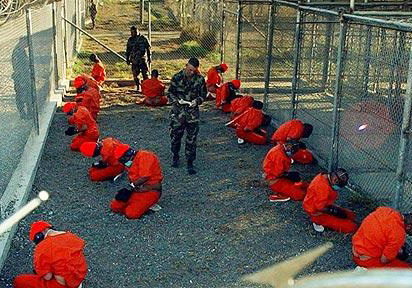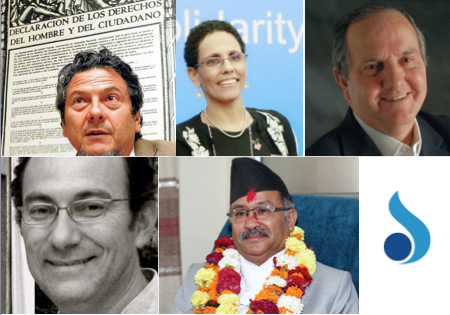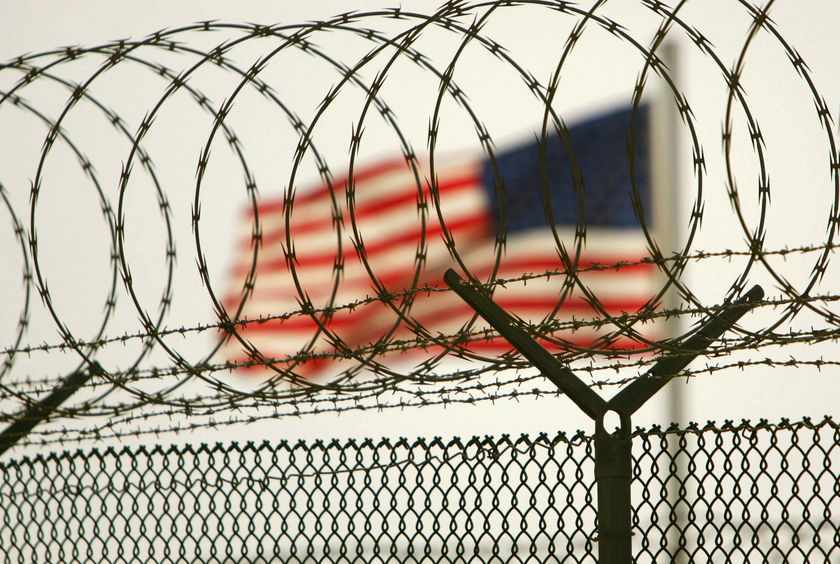
Jan 26, 2017 | News
The ICJ deplores comments made last night by the United States President Donald Trump, expressing approval for the practice of torture in counter-terrorism operations.
The ICJ is also alarmed at reports that the US administration is considering resurrecting the most abusive policies and practices during the early 2000s, including prolonged arbitrary detention in CIA-administered secret “black site” facilities, enforced disappearance, and rendition to other countries for torture and ill-treatment.
“These practices of torturing detainees and ‘disappearing’ them in black sites are serious crimes which must never be repeated,” said Ian Seiderman, ICJ Legal and Policy Director.
“Even President Bush, despite his administration’s appalling record, publicly denounced torture as being against the laws and values of the United States,” he added.
Contact:
Ian Seiderman, ICJ Legal and Policy Director, t: +41 22 979 3837 ; e: ian.seiderman(a)icj.org
Background:
During an interview on US television last night, President Trump repeated his support for torture practices such as waterboarding (near-drowning) and declared that “torture works.”
A number of media reports have indicated that the Trump Administration may issue an Executive Order to review “whether to reinitiate a program of interrogation of high-value alien terrorists to be operated outside the United States” and whether the CIA should be in charge of such a programme.
Counter-terrorism abuses during the Bush administration from 2001-08 involving torture, enforced disappearance, secret detention and rendition were widely condemned as unlawful, morally unacceptable, and ineffective, both internationally and in the US, leading to the abandonment of such practices.
A report by the Eminent Jurists Panel of the ICJ on Terrorism, Counter-terrorism and Human Rights, issued in 2009 conducted after a four-year study concluded that “such practices are not a legitimate response to the threat of terrorism. Such practices are not only inconsistent with established principles of international law, and undermine the values on which free and democratic societies are based, but as the lessons of history show, they put the possibility of short term gains from illegal actions, above the more enduring long term harm that they cause.”
The Obama administration definitively abolished the practices of torture and secret detention upon taking office in 2009, although they had already been substantially wound down in the later years of the second Bush administration.

Jan 5, 2017 | News
Mr Reed Brody (United States), Ms Roberta Clarke (Barbados/Canada), Professor Juan Mendez (Argentina), Mr Alejandro Salinas Rivera (Chile) and Justice Kalyan Shrestha (Nepal) have recently been elected to join the ICJ.
The new Commissioners were elected by a ballot of existing Commissioners, which took place between November and December 2016.
Mr Reed Brody (United States) has 25 years on the cutting edge of the human rights movement. Mr Brody has worked, amongst other things, as a freelance activist, New York Assistant Attorney General, Director of the ICJ’s Centre for the Independence of Judges and Lawyers, Executive Director of the International Human Rights Group (now Global Rights), Director of the Human Rights Division of the UN Observer Mission in El Salvador, Deputy Director of the UN Secretary General’s Investigative Team in the Democratic Republic of Congo and at Human Rights Watch, including on such cases as those against the former Chilean dictator, Augusto Pinochet, and the former dictator of Chad, Hissène Habre.
Ms Roberta Clarke (Barbados/Canada) has an extensive background in working on human rights issues, particularly in relation to women’s rights and social and economic rights. Ms Clarke has held a number of Academic roles including Research Assistant, Junior Research Fellow, Assistant Lecturer and now Visiting Fellow at the University of West Indies. Ms Clarke has also worked as an Attorney in private practice and in a number of civil society and intergovernmental organization roles including as the Project Coordinator of the Women and the Law Project with the Caribbean Association for Feminist Research and Action in Trinidad and Tobago, Social Affairs Officer on the Gender and Development Programme for the UN Economic Commission for Latin America and the Caribbean, Regional Programme Director for UNIFEM/UN Women’s Caribbean Office and then for UN Women’s Regional Office for Asia and the Pacific.
Professor Juan Méndez (Argentina) is currently the UN Special Rapporteur on Torture and Other Cruel, Inhuman and Degrading Treatment or Punishment, having been appointed in November 2010 and then having had his mandate renewed in 2014. Professor Méndez is also a Professor of Human Rights Law in residence at the Washington College of Law. Previously Professor Méndez has worked in a number of human rights roles including as general counsel of Human Rights Watch, Executive Director of the Inter-American Institute of Human Rights in Costa Rica, Professor of Law and Director of the Center for Civil and Human Rights at the University of Notre Dame in Indiana, President of the Inter-American Commission on Human Rights of the Organization of American States, Special Advisor to the Prosecutor of the International Criminal Court, as Co-Chair of the International Bar Association Human Rights Institute, as President of the International Center for Transnational Justice (ICTJ) and as Kofi Annan’s Special Advisor on the Prevention of Genocide.
Mr Alejandro Salinas Rivera (Chile) is a lawyer from Chile with expertise in international issues and cooperation, mining and labour law. Alejandro has collaborated with and ran leading national and international human rights organizations. He has worked as a consultant and adviser for the ICJ as well as for the Ministry of Foreign Affairs, the International Parliamentary Union and the Presidential Advisory Commission for human Rights Policy. He has been the head of a number of Departments and Units in various government agencies including the Ministry of Foreign Affairs, as Director of the Human Rights Department; the Attorney General’s Office as Chief of the Unit of International Affairs; and at the Public Defender’s Officer as Chief of Staff of the National Defender, Head of the Evaluation, Control and Claims Department and Head of the International Cooperation Unit.
Justice Kalyan Shrestha (Nepal) was Chief Justice of the Nepalese Supreme Court from 2005 until his retirement in 2016. Prior to this he served in a number of judicial roles including as Chief Judge of the Appellate Court Jumla, a Judge of various Zonal, District and Appellate courts, Under Secretary in the Ministry of Justice and Law and as a Section Officer for the Supreme Court and Government of Nepal. Justice Shrestha has also held a number of senior roles in judicial bodies including as Chairperson of the Constituent Assembly Court, President of the South Asian Association for Regional Co-operation in Law, President of the Judges Society Nepal and as a Member of the Judicial Services Commission.
In addition to the election of five new members the following Commissioners have also been elected in the following capacity:
- Professor Carlos Ayala (Venezuela) – elected for a second term as Commissioner and a third term on the Executive Committee
- Justice Azhar Cahcalia (South Africa) – elected for a third term on the Executive Committee
- Professor Andrew Clapham (United Kingdom) – elected to the Executive Committee
- Professor Robert Goldman (United States) – elected for a second term as Vice-President
- Ms Hina Jilani (Pakistan) – elected for a second term on the Executive Committee
- Professor Sir Nigel Rodley (United Kingdom) – elected for a third term as President
- Professor Marco Sassòli (Switzerland) – elected for a second term as alternate to the Executive Committee
- Justice Stefan Trechsel (Switzerland) – elected for a second term as alternate to the Executive Committee

Sep 14, 2016 | Events
This panel discussion features two Iraqi torture survivors, Salah Hassan Nsaif and Ali Shallal Abbas, who will share their first-hand accounts serious abuse suffered at Iraq’s notorious Abu Ghraib prison, and the role of U.S. contractors in that torture and abuse.
The event organised by the International Commission of Jurists, the International Federation of Human Rights (FIDH), and the Center for Constitutional Rights, takes place 15 September 2016, 11:00-12:00, at the Palais des Nations Room XXVII in Geneva, Switzerland.
CCR Senior Staff Attorney Katherine Gallagher will discuss legal cases, Saleh v Titan and Al Shimari v CACI, brought in the United States on behalf of victims as they seek justice. The cases will be placed in context of broader corporate accountability efforts, including those of the UN Working Group on Mercenaries and the Open-Ended Working Group on a legally binding instrument on transnational corporations and other business enterprises.
Speakers:
Salah Hassan, journalist and photographer for Al Jazeera network and Abu Ghraib torture survivor
Ali Shallal Abbas, Founder and President of the Association of victims of the American and Iranian prisons in Iraq, and Abu Ghraib torture survivor
Katherine Gallagher, Senior Staff Attorney, Center for Constitutional Rights
Carlos Lopez, Senior Legal Adviser, Business and Human Rights, International Commission of Jurists (moderator)
Remarks will also be made by Patricia Arias, Chair of the UN Working Group on Mercenaries.
Following the event, there will be the opening of an art exhibit organized by the UN Working Group on the use of mercenaries. Ms. Arias, Mr. Nsaif, and Mr. Abbas will make remarks, and guests are invited to engage with the photographs, multimedia display, and virtual reality film. The exhibit is open to delegates, NGOs, and the public. “Private Actors in Warfare: Stories from victims of private military and security companies and foreign fighters” will take place at 13:00 – 15:00 in Palais des Nations Room XXIII.
A flyer for the event may be downloaded, in PDF format, here: side-event-pmsc-abu-graib-sept2016
Feb 24, 2016
(k) JUA 10/07/2015 Case No. USA 15/2015 State Reply: 11/09/2015 Allegations concerning the deportation of Haitians, and in particular persons suffering from serious mental and physical illnesses and requiring appropriated specialized psychological and medical...

Jun 24, 2015 | Advocacy
The ICJ joined more than 100 organizations in endorsing a call before the UN Human Rights Council for accountability of US officials responsible for torture and enforced disappearances in the rendition and secret detention programmes and for reparations to be provided for the victims.
The call was made by the American Civil Liberties Union, the Centrol de Estudios Legales and Sociales, Conectas Direitos Humanos, and the Washington Office on Latin America.
The statement can be downloaded here:
USA-HRC29ShortOralStatementTortureRendition-Advocacy-2015-ENG (short version, in PDF)
USA-HRC29StatementTortureRendition-Advocacy-2015-ENG (full text in PDF)
USA-HRC29StatementTortureRendition-Advocacy-2015-SPA (full text in PDF, Spanish)
USA-HRC29StatementTortureRendition-Advocacy-2015-ARA (full text in PDF, Arabic)








